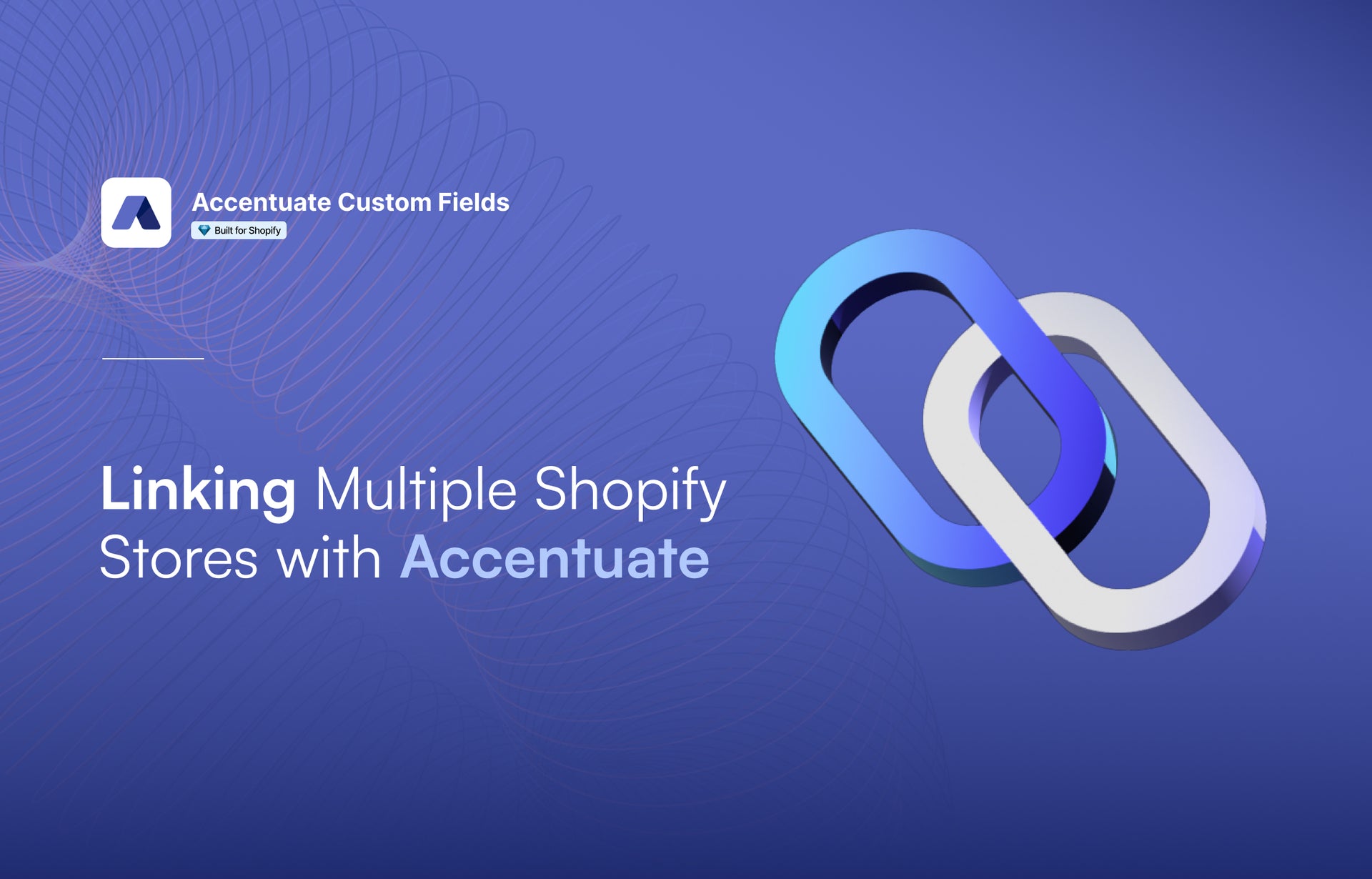Back to all posts
How to link multiple stores in Shopify
Learn how to easily link and manage multiple Shopify stores with Accentuate Custom Fields, keeping your custom fields consistent across all stores.
4 minutes, 12 seconds

Managing multiple Shopify stores can be tricky, especially if they cater to different regions, languages or environments. Accentuate Custom Fields makes this easier by allowing you to link your Accentuate Custom Fields setups together, which simplifies the management of custom field definitions across all your stores. In this blog we will show how you can do it.
Why link Accentuate installations?
When you link your Accentuate Custom Fields installations, you can sync custom field definitions across your stores. This is especially useful for the following:
Multi-language stores
If you run stores in different languages to cater to various markets, keeping the custom field definitions consistent across these stores is crucial. Linking Accentuate Custom Fields installations ensures that all stores, regardless of the language, share the same structure and definitions. This way, you only need to create and update the custom fields once in the master store and the changes will be reflected in all linked stores. This saves time and reduces the risk of errors or inconsistencies in your custom fields.
Region-specific Stores
Managing stores for different regions often means dealing with varying product specifications, regulatory requirements and customer preferences. By linking Accentuate Custom Fields installations, you can maintain a uniform set of custom field definitions across all region-specific stores. This ensures that your product data remains consistent, making it easier to manage and compare performance across regions. For example, if you need to add a new field for a specific regulatory compliance, you can do it in the master store and the change will automatically be applied to all linked region-specific stores.
Different environments (test, staging, live)
When managing multiple environments like test, staging and live stores, it's essential to keep custom field definitions consistent across these environments. This ensures that any changes made in the test environment are accurately reflected in the staging and live environments, reducing the risk of discrepancies. Linking Accentuate Custom Fields installations allows you to synchronize custom field definitions across all environments, making sure that what you test is exactly what goes live. This is particularly important for development teams who need to test new features or updates before rolling them out to the live store.
Linking multiple stores
By linking multiple stores and syncing custom field definitions, you ensure consistency without the hassle of manually updating each store.
Setting up the Master Store
To begin linking your stores, you need to set up a master store that will serve as the primary source for your custom field definitions. This setup ensures that all custom field changes start from one central location.- Choose your Master Store: Select one store to be the master store. This store will serve as the primary source for custom field definitions.
- Access settings: From the master store’s admin side menu, click on the "Settings" button to open the settings dialog, then navigate to the "Stores" tab.

Linking related stores
Next, you'll link your related stores to the master store. This step involves adding the domains of the stores you want to link and verifying access.
- Add linked stores: In the "Linked stores" area, enter the part of the related store's domain before ".myshopify.com" and press Enter. Repeat this step for each store you want to link.
- Verify access with API key: For each linked store, you need to enter that store's API key to verify access. You can find this key in the "Plan" tab of the store’s settings. Once the correct API key is entered, the domain will be shown in green.
- Select synchronization option:
- Complete synchronization: Mirrors field definitions exactly across linked stores. Use this if you want an exact replica of field definitions.
- Partial synchronization: Safer option that won’t delete existing field definitions but may lead to duplicates if sections were manually set up before a sync (relevant for sections created before September 20, 2020).
- Save settings: Click Save to apply the settings and prepare your linked stores for synchronization.
Syncing field definitions
With your stores linked, you can now sync custom field definitions across all stores. This ensures that any updates made in the master store are consistently applied to all linked stores. The Save button for field definitions will now have a drop-down menu. This allows you to select additional targets for your Save operation. Any changes will always be saved to the current store first. Depending on your synchronization settings, the changes will then be applied to the selected linked stores.

Important Note
Be cautious with synchronization settings, especially with the complete sync option. Syncing field definitions could lead to a situation where any fields not mentioned in the current set will be deleted in the target stores. Plan your syncing strategy carefully to avoid unintentional loss of custom field definitions.
Conclusion
Linking multiple stores with Accentuate Custom Fields helps you manage custom field definitions across various stores more easily. By setting up your master store, linking related stores, and choosing the right synchronization options, you can keep your operations consistent and efficient.
We’re here to support you every step of the way. If you have any questions or need assistance, our dedicated support team and specialists are just a call away.



